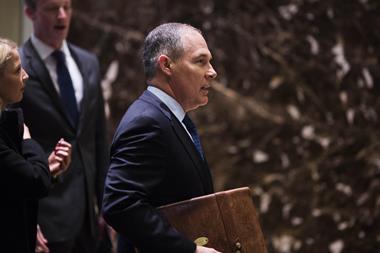Brexit and the US election have bred uncertainty and mischief but not, necessarily, disaster
The adage that ‘everything is political’ has never seemed more palpable. The embittered campaign between Hillary Clinton and Donald Trump has resulted in Trump’s successful nomination to become the 45th president of the US in 2017. At this point there is little specific policy information from the president-elect so we can’t know for sure how chemistry funding, research and collaboration, and the chemical industry will be affected by his election. But, as befits a reality TV star and business mogul, his campaign rhetoric has given commentators plenty to chew on.
Both in Brexit and in the American presidential election, disruptive politics have emerged victorious. And in both cases one can assume that the losers were therefore offering something more predictable, more conventional and, perhaps, something more recognisable as politics. Many commentators have suggested that the electorate in both cases has chosen leaders and causes that purposefully position themselves as anti-political, advocate the dismantling of long-established machinery and rally against the very system into which they seek positions of influence and leadership. We have a new adage: ‘politics is dead’, though one is tempted to add ‘long live politics’.
What does all this mean for chemistry funding, research, teaching and industry? Well, as I said at the start, on both sides of the pond I don’t think we can know for sure, at least not yet (see Phillip Broadwith). Certainly Trump’s campaign provoked impassioned concern from some in the scientific community – Mark Peplow gives voice to some of that. And, so far, similarly robust optimism within the community on a brighter scientific future under the president-elect has been harder to find. However, as Rebecca Trager reports, we are already seeing some in industry respond warmly to a promise of less red tape and more free-market thinking.
Political influence on science is unwelcome, but for scientists to become apolitical is unhelpful. Science does not exist in a vacuum; it cannot remain detached from and untouched by socio-political events and trends. I’m sensitive to the fact we are Chemistry World, not Politics World or Hand-wringing World. But a shift toward national interests rather than international challenges, and of free markets over state funding, is of particular concern for science, as is mounting trepidation toward the free movement of people and immigration. We have clear indicators of the value of state funding, of collaboration, of the movement of people, of science without borders. International teams discovered the new super-heavy elements. International teams won the Nobel prize for molecular machines. Public funding, both national and from international research programmes, featured heavily in both; neither has any immediately obvious application to prompt significant industry investment.
I tend toward pragmatism, and advocate democracy not autocracy. I’m not persuaded by the concept of fate. The electorate made its choice in both cases and thus we are where we are, and where the majority want to be. The future isn’t written, far from it, but the ‘grand narrative’ framing it is changing its tone. Scepticism is healthy, opinions are needed, and a range of voices should be heard. It is right for Chemistry World to provide a space for debate, strong views and counterviews. If you find one without the other, I promise it is only temporary.
I can understand those who are anxious, angry, perhaps disengaged – but there is no better time to pick up the worn-out tools and build the future we want to have. Let’s meet with Trump to avoid disaster. The two are not the same.












No comments yet